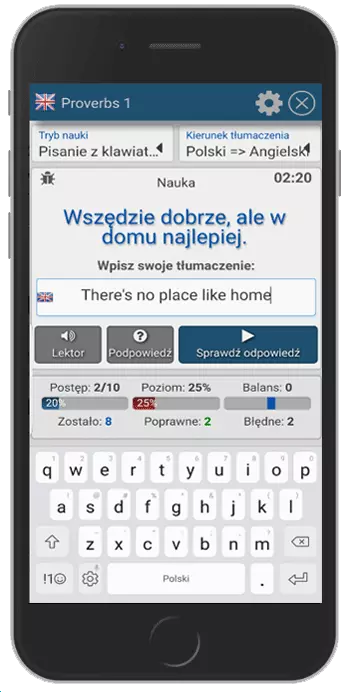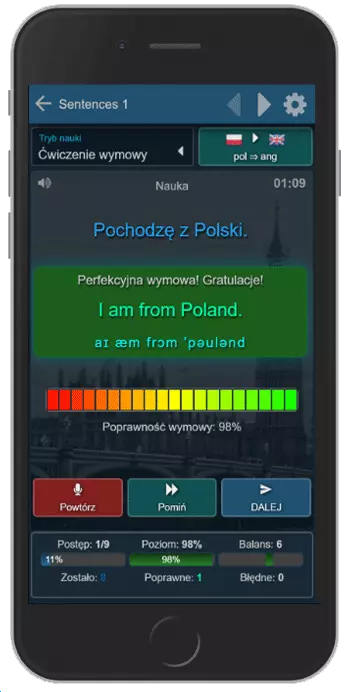| Angielskie słówko [transkrypcja fonetyczna] | Polskie tłumaczenie |
|---|
 |
they [ðeɪ] |
oni, one |
 |
They are (They`re) [ðeɪ ɑ:(r)] |
Oni są, one są |
 |
they have [ðeɪ hæv] |
oni mają |
 |
they have got [ðeɪ hæv gɔt] |
oni mają |
 |
They look tired [ðeɪ luk 'taɪəd] |
Wyglądają na zmęczonych |
 |
They're [ðɛə(r)] |
oni są (contraction) |
 |
they filled out |
wypełnili |
 |
they are very prompt |
są bardzo punktualni |
 |
they aren't [ðeɪ ɑ:nt] |
oni nie są (contraction) |
 |
they put their |
zostawiać za sobą |
 |
they looked at esch other |
oni spojrzeli na siebie |
 |
They were eating breakfast on the balcony [ðeɪ wə:(r) 'i:tɪŋ 'brɛkfəst ɔn ðə 'bælkənɪ] |
oni jedli śniadanie na balkonie |
 |
they go to the cinema |
oni chodzą do kina |
 |
they are angry |
oni są źli (rozzłoszczeni) |
 |
they haven't got [ðeɪ 'hævənt gɔt] |
oni nie mają |
 |
They are in their late teens. |
Oni mają około 17-19 lat. |
 |
they didn't actually complain |
oni tak naprawdę nie narzekali |
 |
they're fine [ðɛə(r) faɪn] |
u nich wszystko w porządku |
 |
they were built |
były zbudowane |
 |
they made me go away |
zmusili mnie bym odeszła |
 |
they are not [ðeɪ ɑ:(r) nɔt] |
oni nie są |
 |
They're exchanging greetings. |
Oni się witają. |
 |
they were [ðeɪ wə:(r)] |
oni byli, one były |
 |
they have been |
oni /one są (od pewnego czasu) |
 |
they will be [ðeɪ wɪl bi:] |
oni / one będą |
 |
they are off [ðeɪ ɑ:(r) ɔf] |
wyjechali |
 |
they can be traded |
można je sprzedawać i kupować |
 |
They all speak good English |
Oni wszyscy mówią dobrze po angielsku |
 |
They went on a two-week holiday. |
They went on a two-week holiday. |
 |
They spent two months touring round Mexico. |
Oni spędzili dwa miesiące podróżując po Meksyku. |
 |
They spent the weekend in the mountains. |
Oni spędzili weekend w górach. |
 |
They're getting married in June |
Oni biorą ślub w czerwcu. |
 |
They left shortly after midnight |
Oni wyszli krótko po północy. |
 |
They went to dinner together after work. |
Oni poszli razem na obiad po pracy. |
 |
They have three children. |
Oni mają troje dzieci. |
 |
They were driving at fifty kilometres per hour [ðeɪ wə:(r) 'draɪvɪŋ æt 'fɪftɪ kilometres pə: 'auə(r)] |
Oni jechali pięćdziesiąt kilometrów na godzinę. |
 |
They travelled seventy kilometres in forty minutes |
Oni przejechali siedemdziesiąt kilometrów w czterdzieści minut. |
 |
They are lying next to each other |
Oni leżą obok siebie. |
 |
they're made of sth |
one są zrobione z czegoś |
 |
They live in a flat |
Oni mieszkają w mieszkaniu |
 |
They read the newspapers on the train |
Oni czytają gazety w pociągu |
 |
They read newspapers at the bus stop |
Oni czytają gazety na przystanku autobusowym |
 |
they-like [ðeɪ laɪk] |
oni lubią |
 |
They could be |
Oni mogą być |
 |
they were drawn together by their common grief |
zbliżyło, połączyło ich wspólne nieszczęście |
 |
They- had- pancakes- with- maple- syrup- for- brea |
They had pancakes with maple syrup for breakfast. Na śniadanie zjedli naleśniki z syropem klonowy |
 |
They usually get up at half past six [ðeɪ 'jju:ʒəwəlɪ gɛt ʌp æt hɑ:f pɑ:st sɪks] |
zazwyczaj wstają o wpół do siódmej |
 |
they don't live together |
nie mieszkają razem |
 |
they place themselves |
oni, one umieszczają się |
 |
They haved=a flat=in London. |
Oni ..... |
 |
They seem to [ðeɪ si:m tu] |
Wydaje się, że oni |
 |
They might be [ðeɪ maɪt bi:] |
Oni mogą być |
 |
They seem to be in love |
wygląda jakby byli zakochani |
 |
They're thirsty [ðɛə(r) 'θə:stɪ] |
Chce im się pić (oni są spragnieni) |
 |
They don't have much money [ðeɪ dəunt hæv mʌʧ 'mʌnɪ] |
Nie mają wiele pieniędzy |
 |
They must save [ðeɪ mʌst seɪv] |
Muszą oszczędzać |
 |
They go for a city tour [ðeɪ gəu fɔ:(r) ə 'sɪtɪ tuə(r)] |
Jadą na przejażdżkę po mieście |
 |
They are ordering lunch [ðeɪ ɑ:(r) 'ɔ:dərɪŋ lʌnʧ] |
Zamawiają obiad |
 |
They start to eat [ðeɪ stɑ:t tu i:t] |
Zaczynają jeść |
 |
They don't what to do with the drunken sailor |
nie wiedzą, co zrobić z pijanym marynarzem |
 |
they used to wear fur coats |
zwykle nosili futra |
 |
They are gonna miss the train |
spóźnią się na pociąg |
 |
They were eating outside, until it began to rain. |
Oni jedli na zewnątrz do czasu aż zaczął padać deszcz. |
 |
they speak ... |
oni mówią ... |
 |
They're from ... (l.m) |
Oni są z ... (l.m) |
 |
They're ...(L.m) [ðɛə(r) Lm] |
To są.... (l.m) |
 |
They are ... (l.m) [ðeɪ ɑ:(r) lm] |
to są ... (l.m) |
 |
they're hitchhiking around Europe [ðɛə(r) 'hɪʧɪŋ ər'aund 'jurəp] |
podróżują autostopem po Europie |
 |
They have two children |
oni maja dwójkę dzieci |
 |
They don't drink coffee |
oni nie pija kawy |
 |
they're going to be very happy |
oni będą szczęśliwi (zadowoleni) |
 |
they love each other [ðeɪ lʌv i:ʧ 'ʌðə(r)] |
kochają się nawzajem |
 |
They may not like it [ðeɪ meɪ nɔt laɪk ɪt] |
Im może się to nie spodobać |
 |
They would have gone home , but they were late for the train. |
Oni mogli pojechać do domu, ale spóźnili się na pociąg. |
 |
they wouldn't |
oni nie chcieliby. |
 |
they walked |
oni poszli |
 |
They're 15 pounds each. |
One są po 15 funtów każda. |
 |
They're too loose. [ðɛə(r) tu: lu:s] |
One są zbyt luźne. |
 |
They speak very quietly |
oni mówią bardzo cicho |
 |
they drive carefully |
oni prowadzą ostrożnie |
 |
they are careful drivers |
oni są ostrożnymi kierowcami |
 |
They're measuring chemicals in a laboratory |
Oni mierzą chemikalia w laboratorium |
 |
they'll be [ðeɪl bi:] |
oni będą (skrót) |
 |
they will not be |
oni nie będą |
 |
they won't be [ðeɪ wəunt bi:] |
oni nie będą (skrót) |
 |
they also agreed with me |
oni także ze mną zgodzili |
 |
they're sold out |
wszystko wyprzedane |
 |
they show what we feel |
one pokazują co my czujemy |
 |
They're both very difficult. |
Obydwa są bardzo trudne. |
 |
they`ve got skrót od they have got |
oni maja |
 |
they can`t skrót od they can not |
oni nie mogą |
 |
they make a lot of computers in America |
w Ameryce produkuje się dużo komputerów |
 |
They must have got stuck in traffic. [ðeɪ mʌst hæv gɔt stʌk ɪn 'træfɪk] |
Musieli utknąć w korku. |
 |
They didn't realize that they needed gas. |
Oni nie uświadamiali sobie, że potrzebowali benzyny. |
 |
They were dead |
oni byli nieżywi |
 |
They left the house |
oni opuścili dom, wyszli z domu |
 |
They were frightent |
oni byli przerażeni |
 |
They're screaming [ðɛə(r) 'skri:mɪŋ] |
oni krzyczą |
 |
they are = they`re [ðeɪ ɑ:(r) = ðɛə(r)] |
oni są |
 |
they are AT home. |
oni są w domu |

 "THEY" w języku angielskim:
"THEY" w języku angielskim: "THEY" w języku polskim:
"THEY" w języku polskim:



















